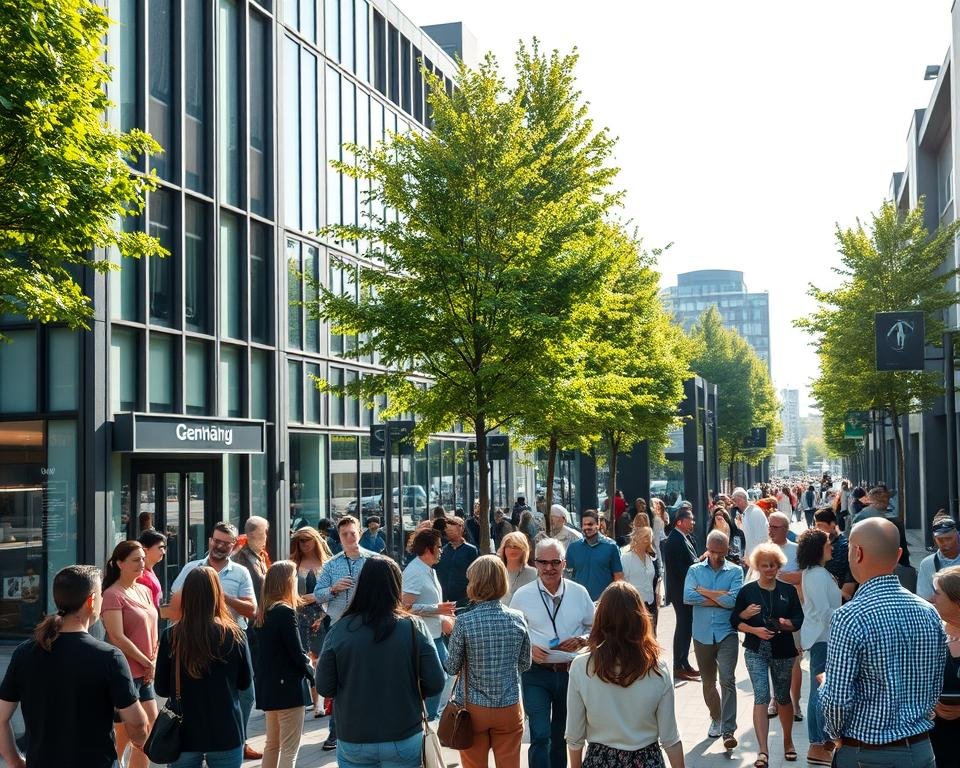How to Get a Job in Germany from Outside the EU

Imagine standing on the edge of a new chapter, filled with dreams of a career in Europe's vibrant economy. Starting a new life and work in Germany can be thrilling and scary. You're not alone in this journey; many expats are also trying to find their place in Germany's job market.
This guide will give you the tools and knowledge to find a job in Germany from abroad. It will help you understand visa requirements and the job market. Whether you're experienced or just starting, knowing how to fit into the German job market is key to achieving your dreams.
- Understanding Visa Requirements for Non-EU Citizens
- Why Germany is an Attractive Destination for Foreign Workers
- Key Industries Hiring Expats in Germany
- How to Get a Job in Germany from Abroad
- Effective Job Search Strategies for International Applicants
- Utilizing Networking to Find Expat Jobs in Germany
- Preparing Your CV for the German Job Market
- Job Application Process in Germany: What You Need to Know
- Understanding Work Culture and Expectations in Germany
- Relocating for Work in Germany: Essential Tips for Expats
- Overcoming Challenges When Working in Germany as a Foreigner
- Job Search Tips for Working in Germany
Understanding Visa Requirements for Non-EU Citizens
Getting a visa for Germany can be tricky but is key for work. There are many options, each for different work needs. The EU Blue Card is for top talent, allowing them to work and live in Germany with a good job offer.
The Job Seeker Visa lets people look for jobs in Germany. It's great for those wanting to find work on their own. To get it, you need the right skills and enough money for living expenses.
There are also permits for certain jobs, like IT or healthcare. You need a job offer, the right skills, and to speak some German. Knowing what documents you need is important for a smooth move to Germany.
Finding remote jobs can make moving easier, opening up more job chances for non-EU citizens.

Why Germany is an Attractive Destination for Foreign Workers
Germany is a top pick for foreign workers looking to move. Its economy is strong, stable, and growing. It's home to top companies in many fields, making it a great place for expat jobs.
The quality of life in Germany is high. Cities like Berlin, Munich, and Frankfurt offer lively scenes, rich culture, and good public services. Germany's central location in Europe makes it easy to explore and network with others.
Germany also values work-life balance. Companies often offer flexible hours and respect personal time. This helps employees live healthier lives. The country's strong labor laws and social systems protect and support workers, making it a great place to work.
Innovation is big in Germany, with a focus on tech and engineering. The job market is dynamic, drawing in skilled workers. Germany's forward-thinking approach to research and development attracts talent from everywhere. All these reasons make Germany a top choice for career growth.

Key Industries Hiring Expats in Germany
Germany's strong economy offers many job chances for expats in different fields. Engineering is a top choice because of its focus on new technology and making things better. Companies need skilled engineers to create and improve products, making it a great job for foreign workers.
The IT sector is also booming, needing more software developers, data analysts, and cybersecurity experts. With digital changes, tech companies and startups offer great jobs for foreigners wanting to join the tech world.
Healthcare is key, as the population gets older. Doctors, nurses, and therapists are in demand to meet healthcare needs. Expats with medical skills find good jobs in Germany, where skilled health workers are valued.
Finance is also exciting, with Frankfurt being a major financial center in Europe. Employers look for financial analysts, accountants, and investment advisors. This shows the growth of the financial services industry in Germany.

Other areas like renewable energy and automotive technology are also growing. Germany's focus on being green creates chances for innovation. Workers in these fields can help with eco-friendly projects and car technology.
Knowing which industries hire expats in Germany can help job seekers. For more job tips, check out this resource that shows different ways to find work in Germany.
How to Get a Job in Germany from Abroad
Getting a job in Germany from abroad needs careful planning. Start by looking for employers that match your career goals. Use LinkedIn, Glassdoor, and job boards for the German market to find opportunities.
Write a cover letter that shows you know the job application process in Germany. Highlight your skills for the job. Personalizing each application shows you're serious and committed.
Using your professional network can help a lot. Talk to recruiters or people in your industry in Germany. They can share tips and open doors to jobs not listed online.
Remote interviews are common now. Make sure you have good internet and a quiet place. Practice answering interview questions to feel more confident and prepared.
Effective Job Search Strategies for International Applicants
Finding a job in Germany needs a clear plan, more so for those from abroad. Using the right job search strategies can really help. Start by going to job fairs in big cities like Berlin, Munich, and Frankfurt. These events let you meet employers face-to-face and offer great chances to network.
Also, using social media, like LinkedIn, is key. Make a professional profile that shows off your skills and experience. Join groups and discussions in your field to get noticed more. Recruitment agencies that focus on jobs in Germany can also help. They know the job market well and have access to jobs not listed online.
Being able to speak German is very important. Many employers want candidates who can speak the language. Learning German can make your application stronger and show you're serious. Plus, knowing about German culture can help you do well in interviews and at work.
Here are some effective job search tips for working in Germany:
- Attend job fairs and industry-specific events.
- Optimize your LinkedIn profile for the German market.
- Engage with local recruitment agencies.
- Enroll in language courses to boost proficiency.
- Research companies and tailor applications to their culture.
Utilizing Networking to Find Expat Jobs in Germany
Networking is key to finding jobs in Germany for expats. It opens doors to opportunities not always listed online. Start by attending events related to your industry. These events help you meet people and build connections.
Online platforms are also great for networking. Websites for expats in Germany help you connect with others who have found jobs. Joining LinkedIn groups or attending webinars can also help. These online spaces lead to new opportunities.
Alumni networks are another great resource. They connect you with former classmates and industry experts. This helps you stay updated on job openings and trends. Joining expat groups also builds a support system and offers advice.
In short, networking in Germany is vital for job seekers. Using both online and offline methods helps you grow your professional network. Investing in these connections can lead to big career wins.
Preparing Your CV for the German Job Market
When writing a CV for Germany, pay close attention to formatting and content. The German job market has its own rules. A CV should be short, no more than two pages, and include only the most important details.
In Germany, it's common to include a professional photo on your CV. This is not always the case in other countries. A good photo can make your application stand out. CVs in Germany usually list your experiences and education in reverse order.
It's important to make your CV easy to read. Employers want to see your skills clearly. Here are the main sections to include:
- Personal Information: Your name, contact details, and a photo.
- Professional Experience: Your work history, focusing on what you've achieved and your responsibilities.
- Education: Your academic background, highlighting any qualifications that are relevant.
- Skills: Your language skills and technical abilities that match the job.
Remember, language is key when preparing your CV for Germany. Even if the job description is in English, try to write your CV in German. This shows your language skills and your willingness to fit in at work.
Knowing how to write a CV for the German job market can really help. A well-made CV tailored to the German job market is a big step towards getting hired.
Job Application Process in Germany: What You Need to Know
Understanding the job application process in Germany is key. You'll need to gather important documents. These include a detailed CV, a strong cover letter, and references from past jobs. You might also need certifications for the role you're applying for.
Interviews in Germany are very professional. Being on time is essential. Interviews will ask about your skills and how you've handled situations before. Being ready with examples from your past can really help.
Follow Germany's application tips closely. Make sure your application fits the job perfectly. Show you know the company's culture and values. Use online job sites and LinkedIn to find jobs and get ahead in your search.
Understanding Work Culture and Expectations in Germany
The work culture in Germany values certain traits highly. Punctuality is seen as a sign of respect for others. Being on time for meetings and deadlines is key, showing reliability in work relationships.
Communication in Germany is direct and clear. People value honesty and straightforwardness, leading to open discussions. This promotes a culture where feedback is seen as a chance to grow.
Companies in Germany have a clear hierarchy. Teamwork is valued, but following rules and respecting authority is important. Employees often seek advice from supervisors, ensuring roles are understood.
Work-life balance is a big deal in Germany. Companies focus on employee well-being, with flexible hours and good vacation policies. This helps create a supportive environment for both work and personal life.
Foreign workers need to understand these aspects to succeed in Germany. Adapting to the work culture can greatly improve their integration and success.
Relocating for Work in Germany: Essential Tips for Expats
Relocating for work in Germany is both exciting and challenging. Finding the right housing is key, as prices and availability differ by city. Websites like Immobilienscout24 and WG-Gesucht have lots of options for all budgets and tastes.
Getting used to public transport is important. Germany has a great network of buses, trains, and trams. Knowing how to use these can make daily travel easier and less stressful. Buying a monthly pass can save money compared to single tickets.
It's vital to understand local customs and rules when moving to Germany for work. Joining in with the community can help you settle in, as people appreciate trying to speak German. Also, you must register with local authorities as soon as you arrive. This is a legal step that's usually easy but can vary by area.
Opening a bank account is another important step. Big banks like Deutsche Bank and Commerzbank have services for expats. Health insurance is also a must, and you can choose between public or private options based on your needs.
| Essential Tasks | Description |
|---|---|
| Finding Housing | Use online platforms like Immobilienscout24 for rental options. |
| Navigating Public Transport | Learn about local transit systems to ease commuting. |
| Registering with Authorities | Complete the registration process within two weeks of arrival. |
| Setting Up a Bank Account | Choose banks that offer services for newcomers. |
| Health Insurance | Decide between public and private coverage options. |
By following these tips, expats moving to Germany for work will find it easier to settle in. Embracing the local culture and making smart choices will make the move much better.
Overcoming Challenges When Working in Germany as a Foreigner
Foreign workers in Germany face many challenges working in Germany. One big issue is language barriers. Not speaking German well can cause misunderstandings at work. Many employers want people who can speak the local language well.
Adapting to the culture is also hard. Getting used to different work habits, social norms, and ways of talking can be tough. For example, Germans value being on time and direct. This can be a big change for those from cultures that are more relaxed.
To deal with these expat challenges in Germany, newcomers can find help. Taking language classes can really improve your skills and confidence. Many cities have programs for expats to learn about local customs and manners.
Support groups and networks are also helpful. Meeting other expats can help you share experiences and find ways to adjust. Local community centers often have events where you can meet people and get involved in the community.
It's important to tackle biases in the workplace. Knowing your rights and talking openly with managers can make work better. Valuing and understanding different cultures can make the workplace more welcoming and productive.
Job Search Tips for Working in Germany
Finding a job in Germany needs careful planning and knowledge of the local job scene. Begin by researching companies that match your skills and goals. Use platforms like LinkedIn and Glassdoor to learn about company cultures and job openings for expats in Germany. Make sure your application shows the skills and experience German employers want.
Understanding Germany's job market trends is also key. Learn about the booming industries to find where your skills are needed. Use local job boards, professional groups, and social media to keep up with new jobs and networking chances.
Being persistent and networking are vital to find a job in this competitive market. Go to industry events, job fairs, and seminars to meet people. Building field connections can give you valuable info and job leads. Stay active and connected to boost your job search success in Germany.
If you want to know other articles similar to How to Get a Job in Germany from Outside the EU You can visit the category Jobs.

Leave a Reply